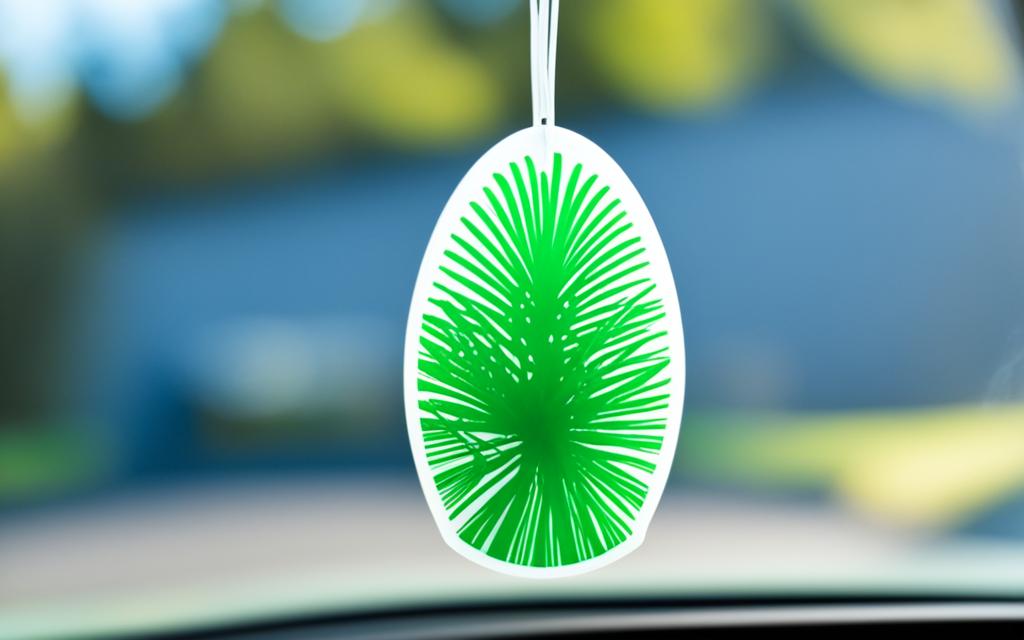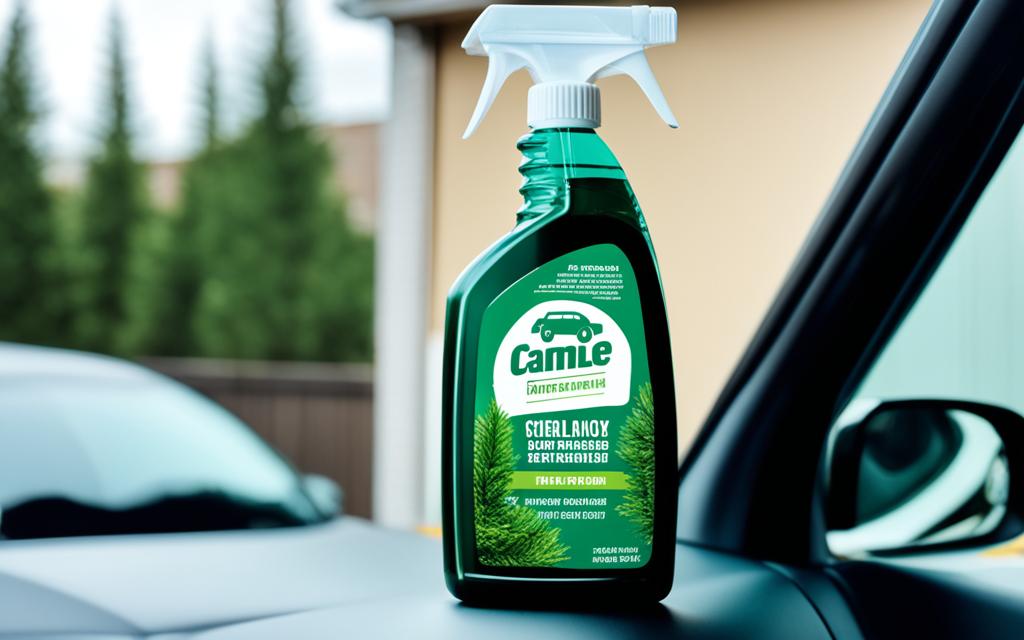Are you greeted by a pungent odor every time you get inside your car? Does it remind you of the unpleasant smell of rotten eggs? Don’t worry, you’re not alone. This article will delve into the reasons behind the sulfuric smell in your car and provide effective solutions to eliminate this foul odor once and for all.
Car odors can be frustrating, especially when they seem to linger no matter what you do. The rotten egg smell is one of the most notorious car odors that many drivers encounter. But what causes this distinctive odor in the first place?
In this article, we’ll explore the possible causes of the rotten egg smell in your car. From issues with your vehicle’s fuel system to a malfunctioning catalytic converter, we’ll uncover the culprits behind this unpleasant scent. Understanding these causes is the first step toward finding a solution.
Key Takeaways:
- The rotten egg smell in your car can be a common and frustrating issue.
- Understanding the causes of the odor is essential in effectively addressing the problem.
- Potential causes include a malfunctioning catalytic converter and problems with the fuel system.
- Diagnosing the source of the odor is crucial for finding the appropriate solution.
- There are various methods and techniques for eliminating car smells, including using car air fresheners.
Understanding the Sulfuric Smell in Your Car
The unmistakable odor of sulfur can quickly ruin your driving experience, leaving you wondering why your car smells like rotten eggs. In this section, we will uncover the factors behind this sulfuric smell and explore how it relates to other unpleasant odors in your vehicle.
When your car emits a sulfuric smell, it is often a sign of an underlying issue. While the scent itself may resemble rotten eggs, the source of the odor goes beyond spoiled food. Various factors can contribute to this unpleasant smell, and understanding them is the first step in finding a solution.
What Causes the Sulfuric Smell?
The sulfuric smell in your car can be attributed to several possible causes. One common culprit is a malfunctioning catalytic converter. This essential component of your vehicle’s exhaust system helps reduce harmful emissions. However, when it malfunctions, it can result in the release of sulfur compounds, leading to the distinctive odor.
Another potential cause is a problem with the fuel system. If there is a leak in the fuel lines or a buildup of sulfur-containing compounds in the fuel tank, it can contribute to the rotten egg smell. Additionally, issues with the battery or electrical system of your car can also create a sulfuric odor.
Addressing the Sulfuric Odor
Now that we’ve explored the factors behind the sulfuric smell in your car, let’s discuss how you can tackle this unpleasant odor. The first step is to identify the specific cause of the smell. This may require a diagnostic test performed by a qualified mechanic.
Once you’ve identified the source, you can take appropriate steps to address the issue. In some cases, repairing or replacing a faulty catalytic converter or fixing the fuel system may be necessary. Regular maintenance, such as cleaning the battery terminals, can also help eliminate the sulfur smell.
In addition to resolving the underlying problem, you can use various techniques to mask or eliminate the sulfuric odor. This may include using car air fresheners or odor neutralizing sprays specifically designed for vehicles. Regularly cleaning and vacuuming the interior of your car can also help remove any lingering odors.
Remember, it’s essential to address the sulfuric smell in your car as soon as possible to prevent potential damage to your vehicle and ensure a pleasant driving experience.
Possible Causes of the Rotten Egg Smell
In this section, we’ll explore the potential causes of that unpleasant rotten egg smell in your car. Understanding these common culprits can help you effectively address the automotive scent issue and eliminate the offensive odor for good.
1. Malfunctioning Catalytic Converter
A faulty catalytic converter is one of the primary reasons behind the car odor resembling rotten eggs. This crucial component helps reduce harmful emissions by converting toxic gases into less harmful substances. However, when it malfunctions, it can result in a sulfuric smell permeating your vehicle. A damaged catalytic converter may require professional inspection and replacement to resolve the issue.
2. Fuel System Issues
Another possible cause of the rotten egg smell is a problem within the fuel system. Your car’s fuel injectors, lines, or even the fuel tank itself can develop issues that lead to the emission of sulfur-like gases. If you suspect a fuel system problem, it’s advisable to seek the expertise of a qualified mechanic who can diagnose and repair the issue.
3. Dead Battery
While a dead battery may not be the first thing that comes to mind when you think of car odors, it can actually contribute to the unpleasant smell resembling rotten eggs. When a battery fails, it can release hydrogen sulfide gas, which has a distinctly sulfurous odor. If you’ve recently had a dead battery or notice a sulfur smell around your battery area, it may be time for a replacement.
4. Contaminated HVAC System
Your car’s heating, ventilation, and air conditioning (HVAC) system can also be a source of the foul smell. If the system becomes contaminated with mold, mildew, or bacteria, it can emit an unpleasant odor that resembles rotten eggs. Regular maintenance and cleaning of the HVAC system, including replacing the cabin air filter, can help prevent and eliminate this issue.
| Possible Causes | Solution |
|---|---|
| Malfunctioning Catalytic Converter | Professional inspection and replacement |
| Fuel System Issues | Seek the expertise of a qualified mechanic |
| Dead Battery | Replace the battery |
| Contaminated HVAC System | Regular maintenance and cleaning |
It’s important to note that these are just a few common causes of the rotten egg smell in your car. Your specific vehicle may have unique factors contributing to the odor. If you’re unable to pinpoint the source or if the odor persists despite your efforts, consulting a professional mechanic is recommended to diagnose and resolve the automotive scent issue.
Diagnosing the Source of the Odor
Identifying the exact source of the car odor and the bad car smell can be crucial in resolving the issue. By understanding the underlying cause, you can take the necessary steps to effectively eliminate the unpleasant odor and enjoy a fresh-smelling car once again.
When dealing with a rotten egg smell in your car, there are several potential sources to consider. It’s essential to approach the diagnostic process systematically to pinpoint the exact source. Here’s a step-by-step guide:
- Begin by inspecting the exhaust system. The catalytic converter, which helps reduce harmful emissions, can sometimes be a culprit. Check for any signs of damage or malfunction, such as cracks or leaks. If you notice any issues, it’s advisable to consult a mechanic for further evaluation and repair. A malfunctioning catalytic converter can lead to the emission of hydrogen sulfide, resulting in the rotten egg smell.
- Next, examine the fuel system. A clogged fuel filter or a leak in the fuel lines can contribute to the unpleasant odor. Inspect the fuel filter for any blockages and ensure the fuel lines are intact without any leaks. If necessary, replace the fuel filter and repair any leaks to resolve the issue.
- Check the battery. A damaged or overcharged battery can release hydrogen sulfide gas, causing the rotten egg smell. Inspect the battery terminals for corrosion and ensure they are securely tightened. If you suspect a battery issue, consult a professional for evaluation and potential replacement.
- Inspect the interior of your car. Sometimes, the source of the odor can be within the car itself. Check under the seats, in the trunk, and in any hidden compartments for food, spills, or other organic matter that may be causing the smell. Remove any debris and clean the affected areas thoroughly.
By following these steps, you’ll be able to diagnose the source of the car odor and the bad car smell effectively. Identifying the exact cause will enable you to address the issue directly, whether it’s related to the exhaust system, fuel system, battery, or interior of your car.
Remember, addressing the underlying cause is key to eliminating the odor permanently, rather than just masking it with temporary solutions. Now, let’s move on to the next section to explore the various methods for fixing the rotten egg smell in your car.
Fixing the Rotten Egg Smell in Your Car
Now that you know what’s causing the odor, it’s time to take action and eliminate it. The rotten egg smell in your car can be unpleasant and persistent, but there are effective methods to get rid of it. Let’s explore different approaches to eliminating car smells, including the use of car air fresheners and other proven odor elimination techniques.
1. Car Air Fresheners
One popular and convenient way to combat the rotten egg smell is by using car air fresheners. These fragrance products are specifically designed to neutralize unpleasant odors and replace them with a fresh, pleasant scent. Car air fresheners come in various forms, such as hanging, vent clips, and sprays, allowing you to choose the most suitable option for your preferences.
When selecting a car air freshener, consider the duration of the fragrance, the intensity of the scent, and any potential allergy concerns. It’s essential to follow the manufacturer’s instructions for optimal usage and to avoid overpowering the car with fragrance.
2. Odor Elimination Techniques
Aside from using car air fresheners, there are other effective techniques for eliminating car smells, including:
- Deep Cleaning: Start by thoroughly cleaning the interior of your car. Remove any debris, vacuum the seats and carpets, and pay special attention to areas where the odor may be trapped.
- Odor Absorbers: Utilize odor absorbers like baking soda or activated charcoal. These natural substances can help soak up and neutralize unpleasant odors.
- Air Circulation: Improve air circulation in your car by opening the windows or using fans to reduce stagnant air. This can help dissipate the smell and freshen up the interior.
TIP: Remember to address any underlying issues that may be causing the persistent smell in your car. If the odor persists despite your best efforts, consider seeking professional help from a mechanic or car detailing service.
3. Keeping Your Car Fresh
Preventing future odors is key to maintaining a pleasant automotive scent. Here are some tips to help keep your car smelling fresh:
- Regular Cleaning: Establish a routine for cleaning your car, including wiping surfaces, vacuuming, and removing any trash promptly.
- Avoid Food Spills: Be mindful of eating in your car to prevent food and beverage spills that can contribute to unpleasant smells.
- Proper Ventilation: Whenever possible, leave the windows cracked open slightly to allow fresh air to circulate, especially after parking in humid or smelly environments.
By following these tips and implementing appropriate odor elimination techniques, you can enjoy a car that smells fresh and inviting.
| Methods | Pros | Cons |
|---|---|---|
| Car Air Fresheners | – Convenient and easy to use – Wide range of fragrances available – Provides immediate odor masking |
– May require frequent replacement – Some fragrances may be overpowering – Allergy concerns for sensitive individuals |
| Odor Elimination Techniques | – Cost-effective solutions – Natural and eco-friendly options – Can address underlying odor causes |
– May require more time and effort – Results may vary depending on the severity of the odor – May need repeated application |

It’s important to find the right approach that works for your specific car odor issue. Remember to be patient and persistent in your efforts to achieve a fresh-smelling vehicle. With the right combination of odor elimination techniques and regular maintenance, you can say goodbye to the rotten egg smell and enjoy a pleasant driving experience.
Overcoming Persistent Car Odors
Sometimes, despite your best efforts, the rotten egg smell in your car may persist. Don’t worry, though! There are additional steps you can take to eliminate these persistent car odors and ensure a fresh and pleasant environment inside your vehicle.
1. Clean and Disinfect:
Start by thoroughly cleaning your car’s interior, including the seats, carpets, and floor mats. Use a mild detergent or upholstery cleaner to remove any dirt, stains, or spills that may be contributing to the odor. Don’t forget to disinfect frequently-touched surfaces, such as the steering wheel, door handles, and gear shift.
2. Odor Absorbers:
Consider using odor absorbers to help eliminate persistent car smells. Place products like activated charcoal, baking soda, or coffee grounds in a breathable container or bag and leave them in your car overnight. These natural absorbents can help neutralize odors effectively.
3. Ventilate Your Car:
Proper ventilation is essential for eliminating odors. Roll down the windows and allow fresh air to circulate through your car while driving. If possible, park your car in a well-ventilated area or use a car air purifier to filter out unwanted smells.
4. Professional Detailing:
If the odor persists, consider seeking professional help from a car detailing service. They have specialized equipment and expertise to deep clean your car, removing any lingering smells and leaving your vehicle smelling fresh and clean.
Remember, persistence is key when it comes to eliminating car smells. By following these additional steps and maintaining a clean and well-ventilated vehicle, you can say goodbye to the rotten egg smell and enjoy a pleasant journey every time you get behind the wheel.
Preventing Future Odors
Keeping your car smelling fresh is essential for a pleasant driving experience. By adopting preventive measures, you can effectively eliminate the recurrence of unpleasant car odors. Here are some tips and advice to help you maintain a pleasant automotive scent:
1. Regular Cleaning
Regularly clean both the interior and exterior of your car to prevent the buildup of dirt, debris, and odor-causing substances. Vacuum the carpets and upholstery, wipe down surfaces, and ensure proper ventilation to minimize the chances of odors developing.
2. Proper Trash Disposal
Dispose of trash promptly to avoid the accumulation of garbage inside your vehicle. Keep a small trash bag or container in the car to collect any trash and empty it regularly. This simple step can significantly reduce the likelihood of foul odors.
3. Check for Leaks
Regularly inspect your car for any potential leaks, such as oil, coolant, or fuel. Addressing these leaks promptly can prevent the liquids from emitting unpleasant odors and causing damage to your vehicle.
4. Use Air Fresheners
Consider using car air fresheners to maintain a pleasant smell inside your vehicle. There are various options available, including hanging air fresheners, vent clips, and sprays. Choose a fragrance that suits your preference and enjoy a fresh-smelling car.
5. Keep Odor Absorbers
Place odor-absorbing materials in your car, such as activated charcoal or baking soda, to help neutralize and eliminate any lingering odors. These natural odor absorbers can be placed in discreet locations, such as under the seats, to continuously freshen the air inside your vehicle.
6. Maintain a Clean Cabin Air Filter
Regularly check and replace your car’s cabin air filter as recommended by the manufacturer. A clean cabin air filter can effectively filter out odors and ensure the circulation of clean, fresh air inside your vehicle.
7. Avoid Smoking in the Car
If you or your passengers smoke, avoid smoking inside the car as it can leave a strong and persistent odor. Instead, designate smoking areas outside the vehicle to prevent the smell from permeating the upholstery and interior.
8. Keep Food and Drinks Sealed
When transporting food or beverages in your car, ensure they are properly sealed to prevent any spills or leaks. Containing these items can help minimize the risk of food or drink odors permeating the interior surfaces.
9. Regularly Inspect the Engine
Have your vehicle’s engine checked and serviced regularly to prevent any mechanical issues that could contribute to unpleasant odors. Addressing engine problems promptly can help maintain a fresh-smelling car.
| Preventive Tips | Description |
|---|---|
| Regular Cleaning | Keep the interior and exterior of your car clean by regularly vacuuming, wiping down surfaces, and ensuring proper ventilation. |
| Proper Trash Disposal | Dispose of trash promptly and keep a small trash bag or container in the car to collect and empty it regularly. |
| Check for Leaks | Regularly inspect your car for leaks, such as oil, coolant, or fuel, and address them promptly to prevent odors. |
| Use Air Fresheners | Consider using car air fresheners to maintain a pleasant smell inside your vehicle. |
| Keep Odor Absorbers | Place odor-absorbing materials, such as activated charcoal or baking soda, in your car to neutralize and eliminate odors. |
| Maintain a Clean Cabin Air Filter | Regularly check and replace your car’s cabin air filter to ensure clean air circulation inside the vehicle. |
| Avoid Smoking in the Car | Avoid smoking inside the car to prevent the strong odor from permeating the upholstery. |
| Keep Food and Drinks Sealed | When transporting food or beverages, ensure they are properly sealed to prevent spills or leaks. |
| Regularly Inspect the Engine | Have your car’s engine checked regularly to prevent mechanical issues that could contribute to unpleasant odors. |
By following these preventive measures, you can effectively maintain a fresh and pleasant automotive scent inside your car, ensuring a more enjoyable driving experience for you and your passengers.

Seeking Professional Help
If you’ve tried everything but still can’t get rid of the rotten egg smell in your car, it might be time to seek professional assistance. While there are many DIY methods to tackle car odor, some cases require the expertise of a mechanic or a car detailing service to address persistent odor issues effectively.
When should you consider reaching out to a professional? Here are some situations where professional help can be beneficial:
- If you’ve thoroughly inspected your car and cannot identify the source of the odor
- If the smell persists even after trying various methods of odor elimination
- If the odor is accompanied by other vehicle issues, such as performance problems or unusual noises
By consulting a qualified mechanic, you can ensure a comprehensive evaluation of your car’s odor problem. They have the expertise to diagnose and fix underlying issues that may be causing the vehicle smell in your car, whether it’s related to the fuel system, exhaust system, or other mechanical components.
If you prefer a more thorough cleaning and treatment for your car’s interior, a professional car detailing service can be a great solution. They have specialized tools and products designed to eliminate stubborn odors and restore your vehicle’s fresh scent. Additionally, they can offer recommendations for ongoing maintenance routines to keep your car smelling clean and pleasant.
Tips for Choosing a Professional Service:
- Research reputable mechanics and car detailing services in your area
- Read customer reviews and check their credentials and certifications
- Inquire about their experience in dealing with car odor issues
- Request a cost estimate and compare prices
- Ask for recommendations from friends, family, or trusted car enthusiasts
Remember, seeking professional help is an investment in the long-term comfort and enjoyment of your vehicle. It can save you time, effort, and frustration by addressing the car odor problem effectively. So don’t hesitate to reach out to the experts when needed.
Conclusion
In conclusion, dealing with a car odor can be frustrating, especially when it smells like rotten eggs. However, with the right knowledge and proactive measures, you can eliminate this bad car smell and restore a fresh and pleasant environment inside your vehicle.
By understanding the potential causes of the rotten egg smell, such as a malfunctioning catalytic converter or fuel system issues, you can diagnose the source of the odor more effectively. This knowledge will guide you in taking appropriate actions to address the underlying problem and eliminate the unpleasant smell.
Whether it’s using car air fresheners, implementing other odor elimination techniques, or seeking professional help when necessary, taking action is crucial to get rid of the bad car smell. With persistence and determination, your efforts will pay off, and you’ll soon be able to enjoy a fresh and odor-free experience every time you get behind the wheel.
FAQ
Why does my car smell like rotten eggs?
The sulfuric smell in your car that resembles rotten eggs can be caused by various factors, including a malfunctioning catalytic converter or issues with the fuel system. We’ll explore the possible causes and provide solutions to fix the odor problem.
How can I get rid of the bad smell in my car?
To eliminate the bad smell in your car, you can try using car air fresheners or other effective odor elimination techniques. We’ll discuss different methods for fixing the rotten egg smell and keeping your car smelling fresh.
What could be causing the vehicle smell in my car?
The vehicle smell in your car can be attributed to various automotive scent issues. It may be related to a malfunctioning part or a problem with the interior. We’ll help you diagnose the source of the odor and provide solutions for eliminating it.
How can I prevent future odors in my car?
Preventing future odors in your car is important to maintain a pleasant automotive scent. We’ll provide tips and advice on how to prevent odors from developing and how to maintain a fresh-smelling vehicle.
When should I seek professional help for car odor issues?
If you have tried various methods but still can’t eliminate the rotten egg smell in your car, it may be time to consult a mechanic or car detailing service. We’ll discuss when it’s appropriate to seek professional help and how they can assist in resolving persistent odor issues.








